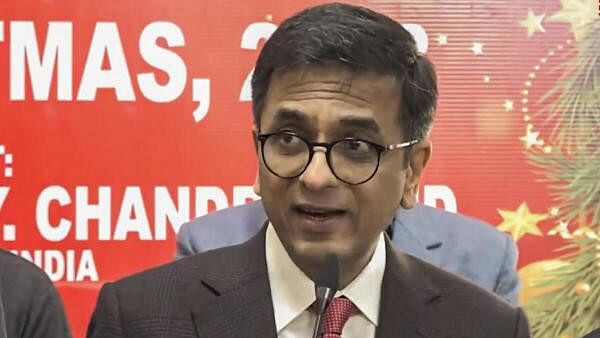
Chief Justice of India D Y Chandrachud.
Credit: PTI Photo
Kathmandu: Juvenile justice is not confined solely to the dictates of the Juvenile Justice Act but is shaped by the intricate interplay of various legislative acts, Chief Justice of India D Y Chandrachud has said, recalling how the apex court recently granted a 14-year-old rape survivor's request for termination of her 30-week pregnancy.
The top court, on April 22, exercised its powers under Article 142 of the Constitution, which empowers it to pass any order necessary for doing complete justice in any case, while permitting the minor girl to undergo the termination of her 30-week pregnancy.
Under the Medical Termination of Pregnancy (MTP) Act, the upper limit for aborting the fetus is 24 weeks for married women as well as those in special categories, including rape survivors and other vulnerable women, such as those differently abled and minors.
CJI Chandrachud, who is in Nepal on a three-day official visit at the invitation of Chief Justice of Nepal Bishwombhar Prasad Shrestha, on Saturday narrated the case of the minor girl while addressing a National Symposium on Juvenile Justice.
India has been making consistent efforts to evolve its juvenile justice system, he said.
The implementation of various juvenile justice legislations for around four decades in India has led to the establishment of facilities, structures, and systems addressing children's needs within the protection system, he said.
"In fact, juvenile justice is not confined solely to the dictates of the Juvenile Justice Act but is rather shaped by the intricate interplay of various legislative acts," he said.
"A recent case brought before the Supreme Court of India exemplifies this: a 14-year-old sought permission to terminate her pregnancy under the Medical Termination of Pregnancy Act of 1971. Fearing repercussions and hindered by her innocence, she kept silent about the abuse she endured until she was well into her pregnancy," he said.
Recognising the importance of safeguarding her mental and physical well-being, the apex court granted her request for termination. However, she ultimately decided against it, he noted.
A critical challenge in the effective implementation of juvenile justice laws is the insufficient infrastructure and resources, especially in rural regions, the CJI said.
Inadequate juvenile detention centres or rehabilitation homes may lead to overcrowding and substandard living conditions, hindering efforts to provide proper support and rehabilitation to juvenile offenders, he said.
"Moreover, limited access to essential services such as counselling, education, or vocational training further complicates the successful reintegration of juveniles into society," he added.
He said the implementation of the juvenile justice laws needs to take social realities into account.
"A study titled 'Rights of Children: A Case Study of Child Beggars at Public Places in India' highlights the alarming reality that approximately 44,000 children are ensnared by criminal gangs in India every year. These children are coerced into engaging in begging, trafficking, smuggling, and other criminal activities," the CJI said.
The implementation of juvenile justice laws should also consider the unique challenges faced by juveniles with disabilities.
'For instance, the United Nations Office on Drugs and Crime in its report (2020) documented the exploitation of visually impaired children in India, who were coerced into begging by criminal syndicates, exploiting both their disability and socio-economic circumstances.
"'In light of such realities, it becomes imperative for juvenile justice systems to adopt tailored approaches that address the specific needs and vulnerabilities of these marginalised groups, ensuring their protection and rehabilitation," he added.
At the same time, he said the changing nature of crimes, particularly with the increasing prevalence of digital crime, poses new challenges for juvenile justice systems globally.
"I emphasise that juvenile justice plays a crucial role in shaping a fair and equitable society through its focus on reformative measures. By placing the well-being of children at the forefront and offering access to rehabilitation and support services, juvenile justice systems help create an environment conducive to the overall growth and development of young offenders," he said.
"Quite often, we focus more on offences committed by juveniles than reflecting on their reformation," the CJI said.
It thus becomes essential to acknowledge the complex nature of juvenile delinquency and take a comprehensive approach that addresses the underlying socio-economic factors contributing to such behaviour, he said.
"By investing in strategies that prevent, intervene, and rehabilitate, we can build a society that is more inclusive and provides every child with the opportunity to fulfil their potential, he added.